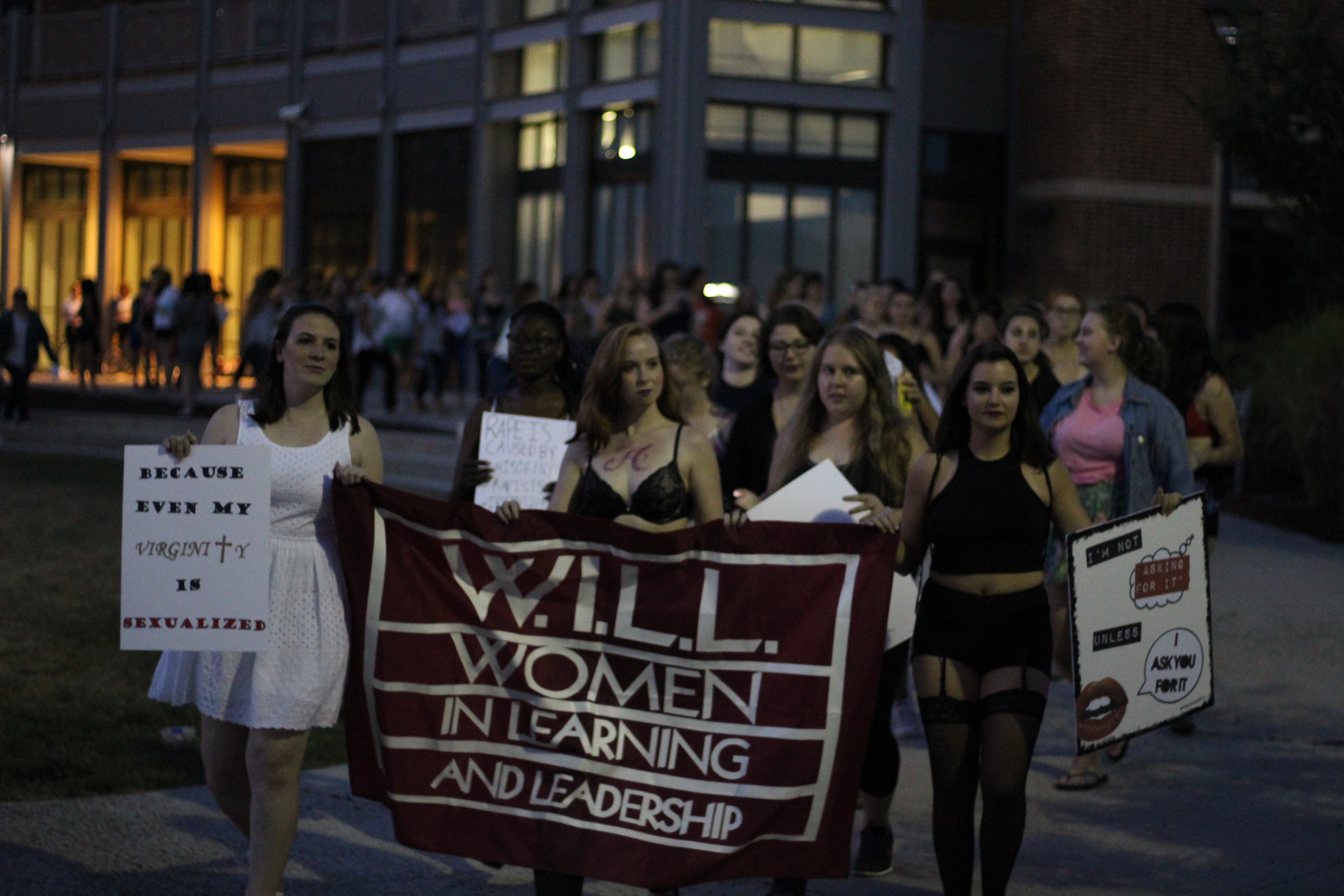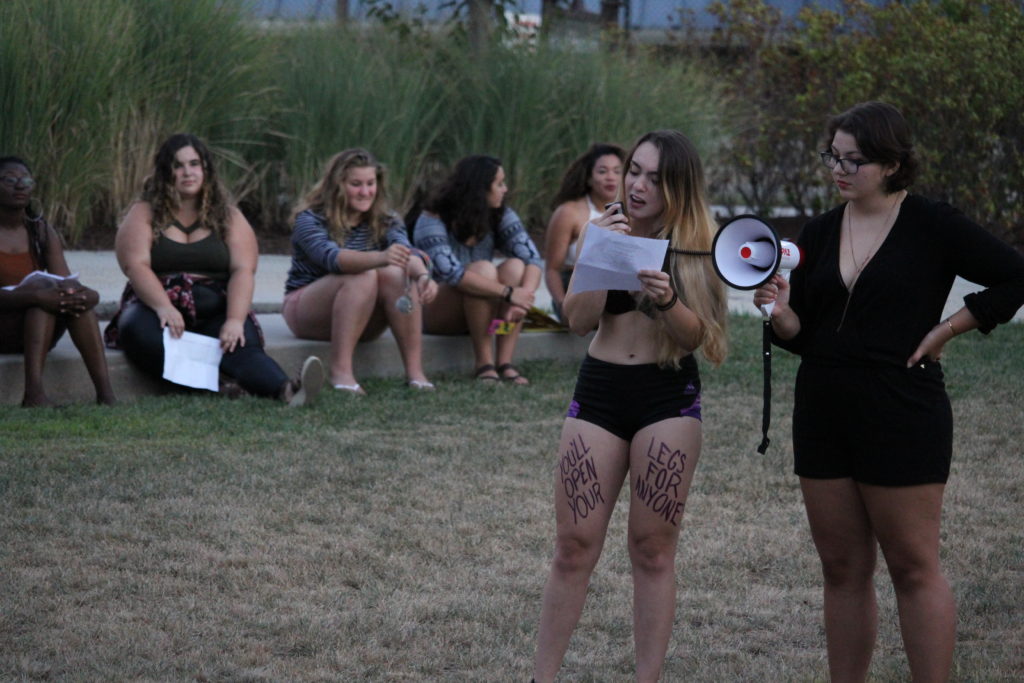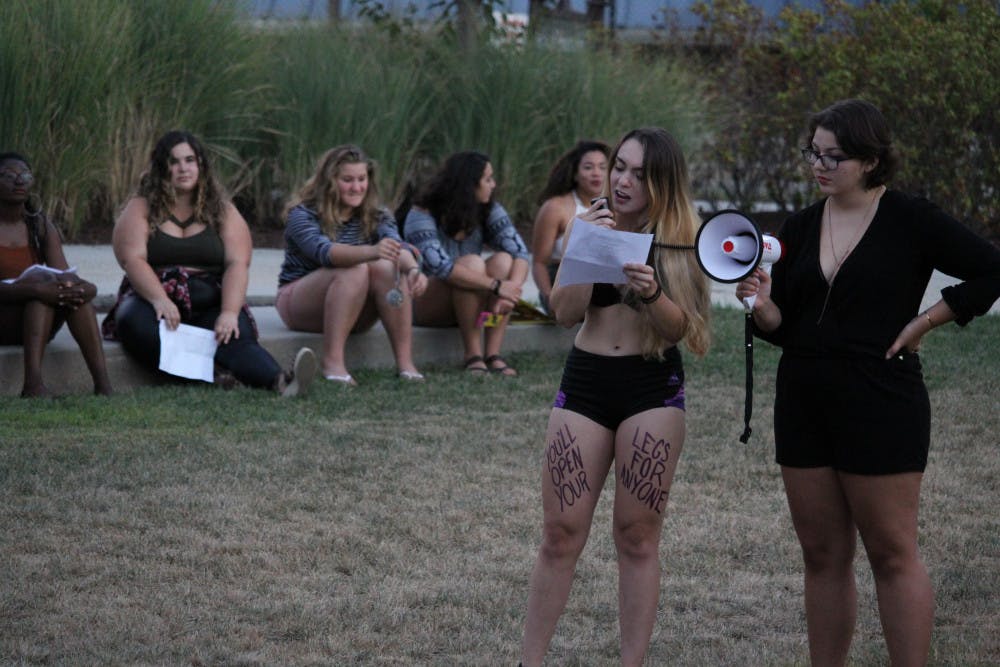[slideshow_deploy id='47863']
By Heidi Cho
Correspondent
“Fuck Brock Turner!”
“Yes means ‘fuck me!’ No means ‘fuck you!’”
“Two, four, six, eight! Stop the violence! Stop the rape!”
These were the chants that rang out on Tuesday, Sept. 13, during the College’s fourth annual Slutwalk. Women In Learning and Leadership (WILL) has hosted Slutwalk since 2013. It draws in about 200 people annually and this year was no different. The protestors gathered at 7 p.m. to create an atmosphere of excitement and solidarity for survivors of sexual assault and rape.
Part of the goal of Slutwalk is to demonstrate how the way someone dresses doesn’t affect their chances of being raped, according to Maggie Kurnyta, WILL’s programming chair and an English and women’s and gender studies double major.
“You can wear long sleeves and jeans — still be raped — can wear bra and underwear — still be raped,” Kurnyta said.
The aim of this event is to show it is only the rapist’s decision that determines who will be raped. Slutwalks began in 2011 in Toronto, Canada, in response to a Toronto police officer who said, “Women should avoid dressing like sluts in order not to be victimized,” according to CNN.

By placing responsibility on the victim’s outfit rather than the rapist’s actions, this police officer participated in victim blaming.
Victim shaming is still relevant in 2016, as Turner, known as the Stanford University rapist, received a six-month jail sentence. Critics of the punishment call it lenient, according to a CNN article from June 7, 2016. His actions and indulgent sentencing inspired the “Fuck Brock Turner!” chant this year.
“Rape on campus is so prevalent and the way the people talk in media and court paint the victim as someone to blame,” said Julie Scesney, a junior international studies major at her first Slutwalk.
According to freshman Kaitlyn Gallagher, rape culture is even more prevalent for people who identify under LGBTQA+.
According to a 2010 report from the National Sexual Violence Resource Center, one in five women in college will be sexually assaulted, while a 2010 study from the Centers for Disease Control and Prevention reported that “lesbian, gay and bisexual people experience sexual violence at similar or higher rates than heterosexuals.”
These statistics are part of the reason why the protestors call our culture a “rape culture.”
Sophomore psychology major Gigi Garrity, WILL co-chair of internal affairs, defines rape culture as “a very negative, very violent culture that, unfortunately, has been very prevalent in our lives — a lot of times in microaggressions.”

As she said this, a person wrote a quote on Garrity’s thighs from someone who had previously told her she flirted too much — “You will open your legs for anyone.”
This is part of the definition of “slut” — a word that implies women who take control of their own sex lives are dirty, and a word that perpetuates rape culture. It is why Kurnyta and others want to reclaim the word “slut” with events like the Slutwalk.
Garrity also touched on microaggressions, which she defined as “subtle but offensive comments or actions directed at a minority or other nondominant groups that is often unintentional.”
Sarah Almeda, a freshman computer science major at her first slutwalk, shared a memory where someone asked, “Why are you wearing makeup? You already have a boyfriend.”
This is an example of a microaggression, since someone implied Almeda was wearing makeup to impress boys. Almeda felt it was important to wear makeup to the protest because she likes makeup.
This event also lets rape survivors know that there are people on their side. Rape survivor and alumna Jennie Sekanics (’16) gave a poignant speech in which she shared details of what she remembers from that night.
She admitted that for years, she was hesitant to call it a rape, but she had an epiphany she shared in her speech: she shamed herself into thinking that it was her fault because she should have known better.
Self-shaming is how women feel in a victim-blaming rape culture, and these protestors rallied to change that.
“If there’s lack of agency over your body, you’re not free,” Kurnyta said. “Rape culture must come to an end.”







